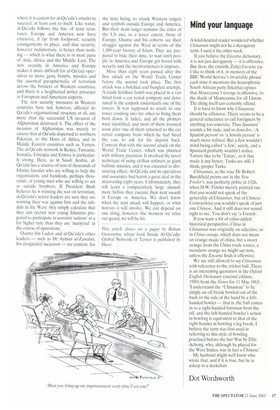Mind your language
A kind-hearted reader wondered whether Chinaman might not be a derogatory term. I used it the other week.
If you believe the Encarta dictionary, it is not just derogatory — it is offensive. But then, the (mainly Zulu) Encarta (as I like to think of it, in memory of the BBC World Service's invariable phrase each time it mentions the homophonic South African party Inkatha) opines that Montezuma's revenge is offensive, to the shade of Montezuma for all I know. The thing itself can certainly offend.
It is hard to know why Chinaman should be offensive. There seems to be a general reluctance to call foreigners by anything too concrete. Thus Spaniard sounds a bit rude, and so does kw. 'A Spanish person' or 'a Jewish person' is much more refined. But a Jew wouldn't mind being called 'a Jew', surely, and a Spaniard probably wouldn't notice. Tartars like to be 'Tatars', as if that made it any better. Turks are still, I think, proper Turks.
Chinaman, as the wise Dr Robert Burchfield points out in the New Fowler's, was perfectly polite in 1926, when H.W. Fowler merely pointed out that you would not speak of the generality of Chinamen, but of Chinese. Contrariwise you wouldn't speak of just one Chinese. And it still does not sound right to me. You don't say 'a French'.
If you want a bit of value-added historical perspective, China in Chinaman was originally an adjective, as in China-orange, which does not mean an orange made of china, but a sweet orange from the China trade routes, a mandarin orange we might say now, unless the Encarta finds it offensive.
We are still allowed to say Chinaman with reference to the cricket ball. There is an interesting quotation in the Oxford English Dictionary (second edition, 1989) from the Times for 11 May 1963: 'I understand the "Chinaman" to be simply an off break bowled out of the back or the side of the hand by a lefthanded bowler — that is, the ball comes in to a right-handed batsman from the off, and the left-handed bowler's action in bowling is equivalent to that of the right-hander in bowling a leg break. I believe the term was first used in referring to this style of bowling practised before the last War by Ellis Achong, who, although he played for the West Indies, was in fact a Chinese.'
My husband might well know who wrote that, and if it is true, but he is asleep in a deckchair.
Dot Wordsworth


































































































 Previous page
Previous page